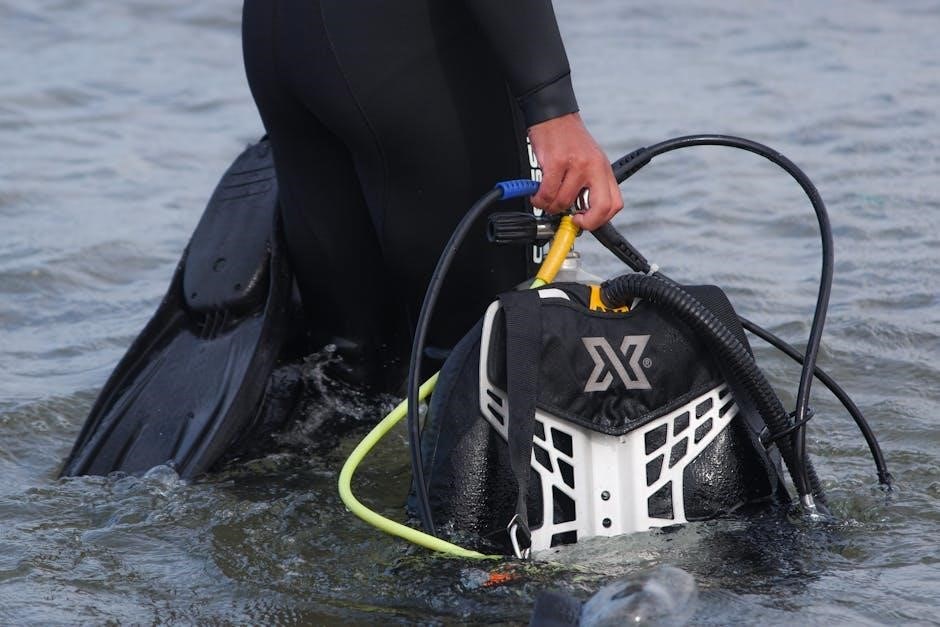The MANDT Training Manual serves as a comprehensive guide for crisis intervention, emphasizing empathy, de-escalation, and trauma-informed care. It provides practical tools to build positive relationships and ensure safety in challenging situations, fostering a person-centered approach for professionals across various fields.

1.1 Overview of the MANDT System
The MANDT System is a comprehensive crisis intervention and relational training program designed to empower individuals with the skills to de-escalate conflicts and build positive relationships. Rooted in empathy and person-centered approaches, the system emphasizes understanding behavior as a form of communication. It integrates trauma-informed care, cultural competence, and physical intervention strategies to ensure safety for all parties involved. The MANDT System is widely used in various settings, including healthcare, education, and social services, to foster healthy interactions and prevent power struggles. By focusing on relational skills and proactive prevention, the system provides a framework for addressing challenging behaviors while maintaining dignity and respect. This approach is foundational to the MANDT Training Manual, which serves as a detailed guide for implementing these principles effectively.
1.2 Importance of the MANDT Training Manual
The MANDT Training Manual is an essential resource for professionals seeking to enhance their crisis intervention skills. Its importance lies in its holistic approach, combining theoretical knowledge with practical exercises to address challenging behaviors effectively. By focusing on empathy, active listening, and trauma-informed care, the manual equips individuals with the tools to de-escalate conflicts and build positive relationships. It serves as a roadmap for creating safe environments, particularly in healthcare, education, and social services. The manual’s emphasis on relational training ensures that professionals can approach situations with compassion and understanding, reducing the risk of restraint-related injuries and fostering a culture of respect. Its structured framework makes it invaluable for both new and experienced practitioners, providing a clear path to mastering the MANDT System’s principles. Ultimately, the manual is a critical tool for anyone committed to promoting safety, dignity, and well-being in their work.
1.3 Historical Background of the MANDT System
The MANDT System was developed in the 1980s as a response to the growing need for effective crisis intervention strategies. Its creation was rooted in the belief that relationships and empathy are central to de-escalating conflicts and supporting individuals in distress. The system was designed to provide professionals with practical tools to manage challenging behaviors while prioritizing safety and dignity for all parties involved. Over time, the MANDT System has evolved to incorporate trauma-informed care, cultural competence, and evidence-based practices, making it a widely recognized standard in fields such as healthcare, education, and social services. Its foundational principles, such as active listening and relational skills, have remained consistent, ensuring its relevance in an ever-changing world. Today, the MANDT System is celebrated for its person-centered approach and its commitment to fostering positive interactions. This historical foundation has solidified its reputation as a trusted resource for professionals seeking to make a meaningful impact.

Key Concepts in the MANDT Training Manual
The MANDT Training Manual emphasizes foundational principles like empathy, de-escalation, and trauma-informed care. It introduces the 5-Step Process for crisis intervention, focusing on building positive relationships and active listening to ensure safety and dignity in challenging situations.
2.1 Foundational Principles of the MANDT System
The MANDT System is rooted in the belief that all individuals are important and deserving of respect. Its foundational principles emphasize building positive, healthy relationships as the cornerstone of crisis intervention. Central to this approach is the understanding that behavior is a form of communication, often stemming from unmet needs or environmental factors. The system advocates for a trauma-informed care model, recognizing the impact of past experiences on behavior. Key principles include empathy, active listening, and de-escalation techniques designed to prevent conflicts from escalating. By fostering a supportive and non-confrontational environment, the MANDT System empowers individuals to manage challenging situations effectively while maintaining safety and dignity for all involved. These principles guide the development of skills that are essential for creating collaborative and cooperative interactions, particularly in high-stress environments.
2.2 The Role of Empathy in De-escalation Techniques
Empathy is a cornerstone of the MANDT System, playing a pivotal role in de-escalation techniques. By understanding and sharing the feelings of individuals in crisis, professionals can create a safe and non-threatening environment. Empathy allows for the validation of emotions, which is essential for building trust and reducing tension. The MANDT System emphasizes that empathy is not about agreeing with the individual but about acknowledging their perspective. This approach helps to diffuse conflict by addressing the root causes of behavior, such as unmet needs or environmental stressors. Through active listening and reflective communication, empathy fosters a connection that encourages cooperation and calmness. The system teaches practitioners to remain patient, composed, and understanding, even in high-stress situations. By integrating empathy into de-escalation strategies, the MANDT System promotes positive outcomes and maintains the dignity of all parties involved. This empathetic approach is a key factor in preventing escalations and resolving conflicts effectively.
2.3 Understanding the 5-Step Process
The 5-Step Process is a cornerstone of the MANDT Training Manual, providing a structured approach to managing challenging behaviors and crises. Step 1 involves recognizing early warning signs of escalation, such as changes in body language or tone of voice. Step 2 focuses on assessing the situation to identify underlying causes of the behavior, whether it’s frustration, fear, or unmet needs.
Step 3 centers on planning an appropriate response, ensuring the environment is safe and selecting effective communication strategies. Step 4 is the active intervention phase, where techniques like active listening, empathy, and de-escalation methods are applied to calm the individual. Finally, Step 5 emphasizes resolution, ensuring the individual’s safety, providing support, and documenting the incident for future learning.
This process aligns with the MANDT System’s emphasis on empathy, relationship-building, and trauma-informed care, offering a clear framework for professionals to manage crises effectively while maintaining dignity and safety for all involved.

Practical Applications of the MANDT Training Manual
The MANDT Training Manual offers real-world strategies for de-escalation, communication, and conflict resolution. It equips professionals with tools to manage challenging behaviors, build rapport, and foster safe environments, ensuring practical implementation across various settings.
3.1 Real-Life Scenarios and Case Studies
The MANDT Training Manual incorporates real-life scenarios and case studies to illustrate practical applications of its principles. These examples span various settings, including education, healthcare, and social services, demonstrating how to effectively manage challenging behaviors;
By analyzing these scenarios, professionals can learn to recognize triggers, assess situations, and apply appropriate interventions. The manual emphasizes empathy and understanding, showing how building rapport can de-escalate conflicts.
Case studies highlight the importance of communication, active listening, and cultural competence. They provide actionable insights into resolving conflicts while prioritizing safety and dignity for all involved.
These practical examples empower individuals to apply MANDT principles confidently, fostering positive outcomes in real-world situations. The manual’s focus on relatable, evidence-based scenarios makes it an invaluable resource for professionals seeking to enhance their crisis intervention skills.
3.2 Building Positive and Healthy Relationships
The MANDT Training Manual emphasizes the importance of fostering positive and healthy relationships as a cornerstone of effective crisis intervention. By understanding that behavior is often a form of communication, professionals can address underlying needs and build trust with individuals in distress.
The manual provides strategies to create safe and supportive environments, encouraging collaboration and mutual respect. It highlights the role of empathy and active listening in de-escalating conflicts and strengthening relationships.
Through practical exercises and real-life examples, the manual teaches how to navigate power dynamics and prevent conflicts. It also underscores the importance of cultural competence and trauma-informed care in relationship-building.
By focusing on these principles, the MANDT System equips professionals with the tools to establish meaningful connections, reducing the likelihood of escalation and promoting long-term positive outcomes. This approach not only enhances workplace safety but also fosters a culture of understanding and respect.
3.3 Active Listening and Communication Skills
The MANDT Training Manual places a strong emphasis on active listening and effective communication as essential skills for de-escalation and relationship-building. By actively listening, professionals can better understand the needs and emotions of individuals in crisis, fostering trust and reducing tension.
The manual provides practical strategies to enhance communication, such as maintaining a calm demeanor, using open-ended questions, and employing non-verbal cues like nodding or maintaining appropriate eye contact. These techniques help create a safe and supportive environment for open dialogue.
Additionally, the MANDT System introduces the R.A.D.A.R. model, which stands for Recognize, Assess, Decide, Act, and Review. This framework helps professionals stay attuned to their surroundings and respond thoughtfully to challenging behaviors.
Through interactive exercises and real-life case studies, the manual equips learners with the ability to navigate complex interactions with confidence. By mastering these communication skills, professionals can effectively de-escalate conflicts and build stronger, more meaningful connections with others. This approach not only enhances safety but also promotes long-term positive outcomes in various settings.

Advanced Techniques in the MANDT Training Manual
The MANDT Training Manual emphasizes active listening as a cornerstone of effective communication, enabling professionals to understand and address the emotional and psychological needs of individuals in crisis. By engaging fully with what is being communicated, both verbally and non-verbally, practitioners can build trust and rapport, which are critical for de-escalation. The manual provides practical techniques, such as maintaining a calm tone, using open-ended questions, and employing empathetic responses, to foster a supportive environment. Additionally, the RADAR model—Recognize, Assess, Decide, Act, and Review—guides professionals in staying attuned to their surroundings and responding thoughtfully to challenging behaviors. Through interactive exercises and real-life scenarios, participants learn to navigate complex interactions with confidence. Mastering these skills not only enhances safety but also promotes long-term positive outcomes by fostering meaningful connections and reducing conflict escalation.
4.1 Physical Intervention Strategies
The MANDT Training Manual dedicates a section to physical intervention strategies, emphasizing their use as a last resort to ensure safety. These techniques are designed to minimize risk and prioritize the well-being of all parties involved. The manual outlines a structured approach to physical interventions, focusing on proportionate responses to escalating situations. Trainees learn how to assess the environment, recognize warning signs, and employ the least restrictive methods necessary. The R.A.D.A.R. model—Recognize, Assess, Decide, Act, and Review—is integral to this process, guiding professionals in making informed decisions. The manual also stresses the importance of proper positioning, balance, and control to prevent injuries. Additionally, it highlights the need for post-intervention care, including de-briefing and support for both the individual and the staff involved. These strategies are complemented by scenario-based training, ensuring practitioners are well-prepared to handle real-life challenges effectively. The goal of these interventions is to restore safety while maintaining dignity and respect for all individuals involved. This approach aligns with the broader MANDT philosophy of fostering positive relationships and reducing the need for physical interventions through proactive de-escalation techniques.

4.2 Cultural Competence in Crisis Intervention
The MANDT Training Manual emphasizes the importance of cultural competence in crisis intervention, recognizing that individuals’ backgrounds, beliefs, and values shape their behaviors and responses. The manual provides guidance on understanding and respecting these differences to ensure effective and empathetic interventions. By fostering cultural awareness, professionals can better navigate diverse situations, reducing misunderstandings and potential escalations. The training encourages self-reflection and open communication, helping practitioners to identify and set aside personal biases. It also highlights the need for adaptability in approaches, ensuring that interventions are tailored to the unique needs of each individual. This section underscores the importance of creating a safe and inclusive environment, where cultural differences are acknowledged and respected. The integration of cultural competence into crisis intervention strategies aligns with the broader MANDT philosophy of building positive relationships and promoting dignity for all individuals involved. This approach not only enhances the effectiveness of interventions but also strengthens trust and collaboration between staff and the individuals they support.

4.3 Trauma-Informed Care Approaches
The MANDT Training Manual integrates trauma-informed care approaches to address the unique needs of individuals who have experienced trauma. This section emphasizes understanding the impact of trauma on behavior and developing strategies to create a safe and supportive environment. By recognizing triggers and avoiding re-traumatization, professionals can respond in ways that promote healing and trust. The manual highlights the importance of empathy, active listening, and non-invasive interventions to de-escalate crisis situations effectively. It also provides practical tools for assessing an individual’s emotional state and tailoring responses to their specific needs. The MANDT System encourages a shift from a punitive to a supportive mindset, focusing on collaboration rather than control. This approach not only enhances safety but also fosters resilience and empowerment for individuals in crisis. By incorporating trauma-informed care, the MANDT Training Manual equips professionals with the skills to navigate complex situations with compassion and effectiveness, aligning with its core philosophy of building positive and healthy relationships. This section is essential for anyone working in fields where trauma-informed practices are critical to ensuring the well-being of both individuals and staff.

Implementation of the MANDT Training Manual
The MANDT Training Manual outlines a structured approach for successful implementation, including staff certification, ongoing education, and monitoring of training effectiveness. It emphasizes integrating MANDT principles into workplace culture to ensure long-term success and sustainability.
5.1 Staff Training and Certification Process
The MANDT Training Manual outlines a detailed certification process for staff, ensuring they gain the necessary skills to effectively manage crisis situations. Initial training involves classroom instruction led by certified MANDT trainers, focusing on relational skills and de-escalation techniques. Participants must also complete e-learning modules to reinforce concepts. Certification requires sequential completion of training within a 3-month period, with a strong emphasis on practical exercises and real-life scenarios.
Key components include understanding the 5-Step Process, empathy-based communication, and trauma-informed care principles. Staff must demonstrate proficiency in these areas to achieve certification. The program also mandates ongoing education to maintain certification, ensuring continuous skill development. This structured approach ensures that staff are well-equipped to integrate MANDT principles into their daily interactions, fostering a safer and more supportive work environment. The certification process is designed to promote long-term retention of skills and adaptability in diverse situations.
5;2 Monitoring and Evaluating Training Effectiveness
The MANDT Training Manual emphasizes the importance of monitoring and evaluating the effectiveness of its training programs to ensure they meet their intended goals. This process involves assessing how well participants have mastered the skills and principles taught, such as de-escalation techniques, empathy, and trauma-informed care.
Key evaluation methods include pre- and post-training assessments to measure skill development, as well as practical exercises and scenario-based simulations to test real-world application. Feedback from participants and supervisors is also crucial, providing insights into the training’s impact and identifying areas for improvement.
Additionally, the program incorporates monitoring tools to track the implementation of MANDT principles in workplace settings. This ensures that the training translates into measurable changes in behavior and crisis management practices. Regular follow-ups and periodic reviews of training outcomes help maintain high standards and facilitate continuous improvement. By systematically evaluating training effectiveness, the MANDT System ensures that professionals are equipped to handle challenging situations safely and compassionately.
5.3 Integrating MANDT Principles into Workplace Culture

Integrating MANDT principles into workplace culture is essential for creating a supportive and safe environment. The MANDT Training Manual provides a roadmap for organizations to embed its values, such as empathy, respect, and trauma-informed care, into daily operations.
Leadership plays a pivotal role in fostering this cultural shift by modeling MANDT behaviors and prioritizing staff well-being. Training programs are tailored to address specific workplace challenges, ensuring relevance and applicability.
Regular reminders, such as workshops and feedback sessions, reinforce these principles, encouraging consistency across teams. By aligning organizational values with MANDT’s person-centered approach, workplaces can reduce conflicts and enhance overall safety, creating a culture where empathy and understanding guide interactions. This integration not only benefits individuals but also strengthens the organization as a whole, promoting a positive and resilient work environment.
The MANDT Training Manual offers a transformative approach to crisis intervention, emphasizing empathy, de-escalation, and trauma-informed care. By fostering positive relationships and safe interactions, it paves the way for future advancements in conflict resolution and workplace safety.

6.1 Summary of Key Takeaways
The MANDT Training Manual provides a comprehensive approach to crisis intervention, emphasizing empathy, de-escalation, and trauma-informed care. Key takeaways include the importance of building positive relationships, active listening, and understanding the 5-Step Process for conflict resolution. The system highlights cultural competence and the need to prioritize safety while supporting individuals in challenging situations. By focusing on prevention and collaboration, the MANDT System equips professionals with practical tools to de-escalate conflicts and foster a supportive environment. The manual also underscores the value of continuous learning and the integration of its principles into workplace culture. Overall, the MANDT Training Manual serves as a transformative resource for creating safer, more empathetic interactions in various settings.
6.2 The Future of Crisis Intervention Training
The future of crisis intervention training lies in advancing trauma-informed care, empathy, and de-escalation techniques. The MANDT Training Manual emphasizes the importance of continuous learning and adaptation to meet evolving challenges. As organizations prioritize workplace safety and cultural competence, the integration of technology, such as virtual reality simulations, may enhance training effectiveness. Additionally, the focus on building positive relationships and preventing power struggles will remain central to crisis intervention. The MANDT System’s emphasis on collaboration and cooperation will continue to shape the future of training, ensuring that professionals are equipped to handle complex situations with compassion and skill. By fostering a culture of empathy and understanding, the future of crisis intervention training will prioritize sustainable, person-centered approaches that promote safety and well-being for all individuals involved. This evolution will ensure that the MANDT System remains a leader in innovative and effective crisis management strategies.
6.3 Encouraging Continuous Learning and Development
Continuous learning and development are vital for sustaining proficiency in crisis intervention. The MANDT Training Manual underscores the importance of ongoing education to adapt to new challenges and refine skills. By fostering a culture of lifelong learning, organizations can ensure that their teams remain equipped with the latest techniques in de-escalation, empathy, and trauma-informed care. Regular refresher courses, workshops, and access to updated resources, such as the MANDT Training Manual, play a crucial role in maintaining high standards of practice. Encouraging professionals to engage in self-study and peer discussions further enhances their ability to apply MANDT principles effectively. This commitment to continuous growth not only improves individual competence but also strengthens the overall effectiveness of crisis intervention strategies within organizations. By prioritizing learning and development, professionals can consistently provide safe, compassionate, and person-centered care in all situations. This approach ensures that the MANDT System remains a cornerstone of modern crisis management, empowering individuals to navigate complex scenarios with confidence and expertise.
